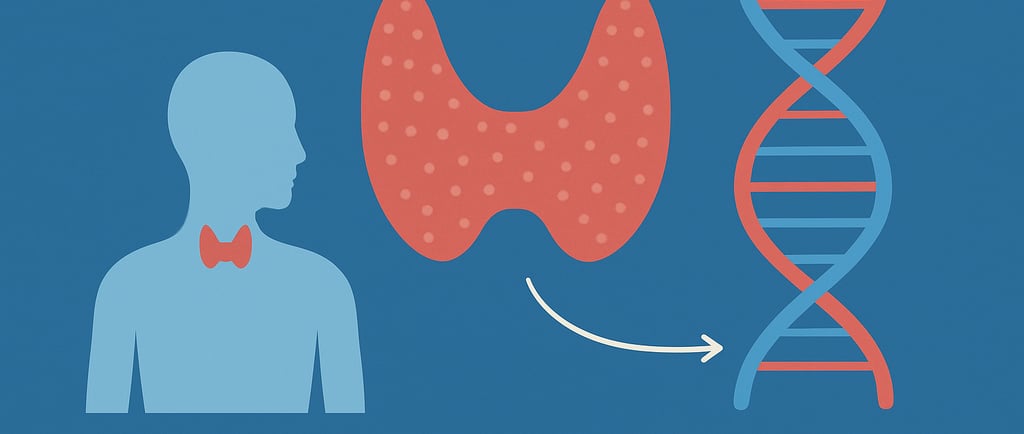MTHFR Gene Polymorphisms and Thyroid Disorders: An Emerging Epigenetic Link
Recent studies reveal that variations in the MTHFR gene, particularly C677T and A1298C, may influence thyroid health. These polymorphisms can disrupt folate metabolism, elevate homocysteine levels, and impair DNA methylation—contributing to autoimmune thyroid diseases and even thyroid cancer risk. Understanding this genetic link opens the door to better risk assessment, early detection, and targeted interventions with folate and vitamin B12.
Dr.Muhammad Babar Imran
8/31/20251 min read


MTHFR Gene Polymorphisms and Thyroid Disorders: An Emerging Epigenetic Link
The methylenetetrahydrofolate reductase (MTHFR) gene encodes a key enzyme in one-carbon metabolism, regulating folate activation, homocysteine clearance, and DNA methylation. Common variants, particularly C677T and A1298C, reduce enzymatic activity, leading to hyperhomocysteinemia and DNA hypomethylation. While MTHFR polymorphisms are well established in cardiovascular and neurological disease, emerging evidence indicates a significant association with thyroid disorders.
In autoimmune thyroid disease (AITD), impaired methylation may dysregulate immune tolerance, enhancing autoreactive T- and B-cell responses. Several studies have linked C677T polymorphism with Graves’ disease and autoimmune hypothyroidism, often with higher antibody titres and more severe phenotypes. Hypothyroid patients carrying MTHFR variants also exhibit elevated homocysteine, compounding cardiovascular risk.
In thyroid cancer, aberrant DNA methylation is central to carcinogenesis. Folate deficiency and reduced methyl availability from MTHFR polymorphisms may promote oncogene activation and tumour suppressor silencing. Clinical studies and meta-analyses suggest that the C677T variant increases papillary thyroid carcinoma risk, particularly in Asian populations.
These observations position MTHFR as a potential genetic modifier of thyroid disease susceptibility and progression. Clinically, this raises opportunities for risk stratification, homocysteine monitoring, and targeted nutritional interventions with folate and vitamin B12. However, existing evidence is heterogeneous, limited by small sample sizes, and influenced by gene–environment interactions.
Future directions include large multicentre studies, epigenetic profiling, and intervention trials to clarify the clinical impact of MTHFR in thyroid disorders. Understanding this intersection between metabolism, genetics, and endocrinology may advance both preventive and therapeutic strategies.
مریضوں کے لیے آسان خلاصہ
MTHFR جین ہمارے جسم میں ایک اہم انزائم بناتا ہے جو فولک ایسڈ (وٹامن B9) کو استعمال کے قابل بناتا ہے اور خون میں موجود ایک مادہ ہوموسسٹین کو کم رکھنے میں مدد کرتا ہے۔ یہ جین جسم کے ڈی۔این۔اے کو بھی صحت مند رکھنے کے لیے ضروری ہے۔
جب اس جین میں تبدیلی (میوٹیشن) آتی ہے، تو انزائم کمزور ہو جاتا ہے۔ اس کے نتیجے میں:
خون میں ہوموسسٹین کی مقدار بڑھ جاتی ہے، جو دل کی بیماریوں اور دورانِ خون کی خرابیوں کا سبب بن سکتی ہے۔
جسم میں فولک ایسڈ کا درست استعمال نہیں ہو پاتا۔
ڈی۔این۔اے کے کام میں بھی مسئلہ ہو سکتا ہے جس سے مدافعتی نظام اور خلیوں کی نشوونما متاثر ہوتی ہے۔
تھائیرائیڈ پر اثرات
یہ تبدیلیاں خودکار مدافعتی تھائیرائیڈ بیماریوں (جیسے ہاشی موتو اور گریوز) کو بڑھا سکتی ہیں۔ ایسے مریضوں میں تھائیرائیڈ کے خلاف اینٹی باڈیز زیادہ بنتی ہیں۔
کچھ تحقیقات کے مطابق، یہ تبدیلیاں تھائیرائیڈ کینسر (خاص طور پر پیپیلیری تھائیرائیڈ کینسر) کے خطرے کو بھی بڑھا سکتی ہیں۔
ہائپوتھائیرائیڈ مریضوں میں یہ تبدیلی ہوموسسٹین کو اور بھی بڑھا دیتی ہے، جس سے دل کے امراض کا خطرہ زیادہ ہو سکتا ہے۔
مریضوں کے لیے مشورے
ایسے مریضوں کو چاہیے کہ وہ اپنے ڈاکٹر کے مشورے سے فولک ایسڈ اور وٹامن B12 کا استعمال کریں تاکہ نقصانات کو کم کیا جا سکے۔
ہوموسسٹین کی سطح کی جانچ (بلڈ ٹیسٹ) کرانا فائدہ مند ہے، خاص طور پر اُن مریضوں کے لیے جنہیں تھائیرائیڈ یا دل کی بیماری ہو۔
متوازن خوراک، جس میں سبز پتوں والی سبزیاں، دالیں، اور وٹامنز شامل ہوں، بہت اہم ہے۔

Contact
Get in touch for inquiries or appointments.
Connect
muhammadbabarimran@yahoo.com
03001551966
© 2025. All rights reserved. Dr.Muhammad Babar Imran
